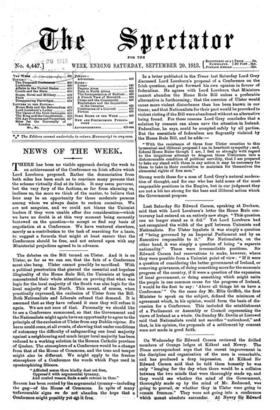Last Saturday Sir Edward Carson, speaking at Durham, said that
with Lord Loreburn's letter the Home Rule con- troversy had entered on an entirely new stage. "This question can no longer stand as it did." Yet Lord Loreburn had not recognized the width of the gulf between Unionists and Nationalists. For Ulster loyalists it was simply a question of "being governed by an Imperial Parliament and by an Executive responsible to it." For Nationalists, on the other band, it was simply a question of being "a separate nationality." These were irreconcilable positions. Sir Edward Carson bad reservations to make, however, where they were possible from a Unionist point of view : " If it were a question of considering the better government of Ireland, or removing grievances, of doing something more for the economic progress of the country, if it were a question of the expansion of local government, or doing something which might unite the people in one common cause for the progress of Ireland, I would be the first to say : Above all things let us have a Conference.' " On the same day Mr. Ellis Griffith, the first Minister to speak on the subject, defined the minimum of agreement which, in his opinion, would form the basis of dis- cussion for a Conference. This included the establishment of a Parliament or Assembly or Council representing the views of Ireland as a whole. On Sunday Mr. Devlin at Listowel said that Nationalists could not sacrifice " nationhood," and that, in his opinion, the proposals of a settlement by consent were not made in good faith.










































